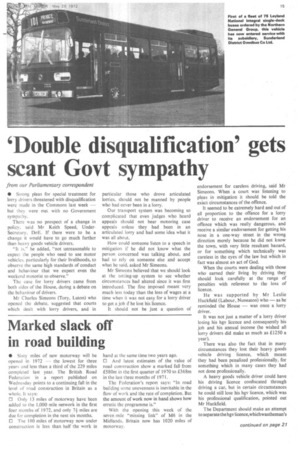'Double disqualification' gets scant Govt sympathy
Page 17

If you've noticed an error in this article please click here to report it so we can fix it.
from our Parliamentary correspondent
I Strong pleas for special treatment for lorry drivers threatened with disqualification were made in the Commons last week — but they were met with no Government sympathy.
There was no prospect of a change in policy, said Mr Keith Speed, UnderSecretary, DoE. If there were to be a change it would have to go much further than heavy goods vehicle drivers.
"It is." he added, "not unreasonable to expect the people who need to use motor vehicles, particularly for their livelihoods, to observe the same high standards of conduct and behaviour that we expect even the weekend motorist to observe."
The case for lorry drivers came from both sides of the House, during a debate on the behaviour of drivers.
Mr Charles Simeons (Tory, Luton) who opened the debate, suggested that courts which dealt with lorry drivers, and in particular those who drove articulated lorries, should not be manned by people who had never been in a lorry.
Our transport system was becoming so complicated that even judges who heard appeals should not hear motoring case appeals unless they had been in an articulated lorry and had some idea what it was all about.
How could someone listen to a speech in mitigation if he did not know what the person concerned was talking about, and had to rely on someone else and accept what he said, asked Mr Simons.
Mr Simeons believed that we should look at the totting-up system to see whether circumstances had altered since it was first introduced. The fine imposed meant very much less today than the loss of wages at a time when it was not easy for a lorry driver to get a job if he lost his licence.
It should not be just a question of endorsement for careless driving, said Mr Simeons. When a court was listening to pleas in mitigation it should be told the exact circumstances of the offence.
It seemed to be extremely hard and out of all proportion to the offence for a lorry driver to receive an endorsement for an offence which was really dangerous, and receive a similar endorsement for getting his nose in a one-way street in the wrong direction merely because he did not know the town, with very little resultant hazard, or for something which technically was careless in the eyes of the law but which in fact was almost an act of God.
When the courts were dealing with those who earned their living by driving they should look carefully at the range of penalties with reference to the loss of licence.
• He was supported by Mr Leslie Huckfield (Labour, Nuneaton) who — as he reminded the House — was once a lorry driver.
It was not just a matter of a lorry driver losing his hgv licence and consequently his job and his annual income (he wished all lorry drivers did make as much as £1250 a year).
There was also the fact that in many circumstances they lost their heavy goods vehicle driving licence, which meant they had been penalized professionally, for something which in many cases they had not done professionally.
A heavy goods vehicle driver could have his driving licence confiscated through driving a car, but in certain circumstances he could still lose his hgv licence, which was his professional qualification, pointed out Mr Huckfield.
The Department should make an attempt to separate the hgv licence,whichwastheman's




































































































